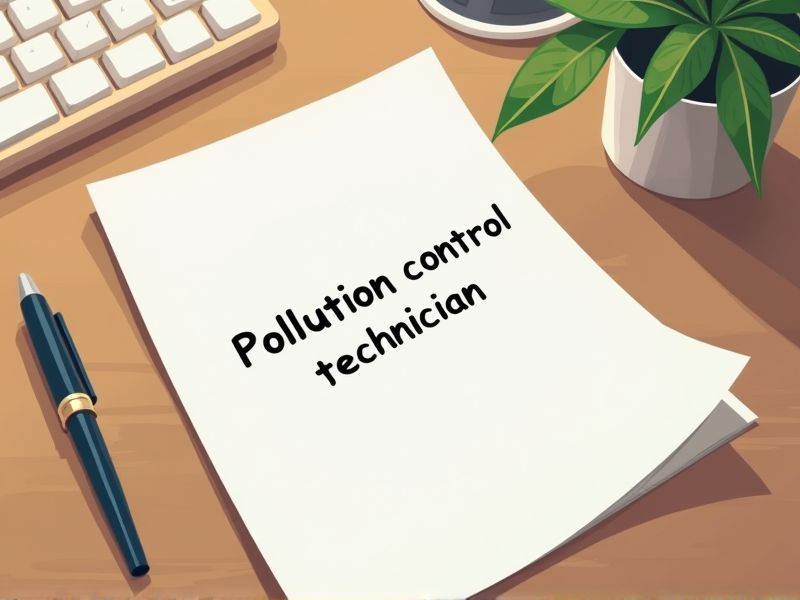
Pollution control technicians play a crucial role in monitoring and mitigating environmental contamination, making their expertise vital for public health and safety. A few certifications are essential because they validate the technician's knowledge and skills, ensuring they are equipped to handle complex equipment and adhere to regulatory standards. Certifications also enhance a technician's credibility and increase job opportunities in a competitive field focused on sustainable practices. Important certifications may be necessary for a career as a Pollution Control Technician.
OSHA HAZWOPER Certification
Pollution control technicians often encounter hazardous materials, making OSHA HAZWOPER Certification crucial for understanding and managing these risks safely. The certification ensures they are qualified to implement emergency response protocols, protecting both themselves and the environment. Failure to have certified personnel can lead to significant safety violations and financial penalties for employers. Proper training through certification reduces the likelihood of workplace incidents related to hazardous waste exposure.
EPA Hazardous Waste Operations Certification
Pollution control technicians often work in environments where hazardous waste is present. Obtaining EPA Hazardous Waste Operations Certification ensures they have the necessary training to handle and dispose of such waste safely. This certification reduces the risk of accidents and exposure, protecting both the workers and the environment. It also ensures compliance with federal regulations, which can prevent legal penalties for employers.
RCRA Compliance Certification
RCRA Compliance Certification is necessary for a pollution control technician because it ensures adherence to the Resource Conservation and Recovery Act's regulations designed to manage hazardous waste properly. Proper certification reduces the risk of environmental contamination due to improper waste management, which directly impacts public health and ecosystem integrity. Certified technicians demonstrate competence in handling and disposing of waste safely, minimizing the potential for legal penalties and costly clean-up operations. Ensuring compliance also facilitates the organization's eligibility for grants and permits, essential for operational continuity and environmental responsibility.
ISO 14001 Environmental Management Systems Lead Auditor Certification
The ISO 14001 Environmental Management Systems Lead Auditor Certification equips pollution control technicians with the necessary skills to systematically assess and improve an organization's environmental management practices. Holding this certification often enhances a technician's credibility and effectiveness in identifying environmental risks and compliance issues. The certification also ensures that technicians are familiar with international standards, enabling them to help organizations achieve sustainable practices. Technicians with this certification can more effectively drive change and ensure continuous environmental improvement within the facilities they oversee.
Certified Environmental Technician (CET) Certification
Certified Environmental Technician (CET) Certification ensures that pollution control technicians possess the necessary skills and knowledge to effectively manage environmental hazards. The certification validates expertise in regulatory compliance, which is crucial for minimizing legal risks and environmental liabilities. Employers often seek CET-certified technicians to ensure adherence to best practices in pollution management and sustainable operations. The certification also enhances credibility and professional development, making technicians more competitive in the job market.
Certified Industrial Hygienist (CIH)
Certified Industrial Hygienists possess specialized knowledge in identifying and assessing environmental hazards, which enhances a pollution control technician's ability to address air and water quality issues effectively. Their expertise in designing control measures and management plans directly influences the reduction of harmful exposures to pollutants in industrial settings. CIHs are trained to interpret and comply with regulations, which aids organizations in maintaining legal compliance and avoiding potential regulatory penalties. Their ability to evaluate workplace health risks supports continuous improvement in environmental health and safety programs, resulting in safer and healthier communities.
Certified Hazardous Materials Manager (CHMM)
Pollution control technicians benefit from CHMM certification because it provides in-depth knowledge of managing hazardous materials safely, reducing risks of environmental contamination. Employers often seek CHMM-certified personnel, recognizing that they possess standardized expertise in compliance and regulatory frameworks. Through CHMM training, technicians develop skills in assessing and mitigating hazards, essential for implementing effective pollution control measures. Enhanced credibility and professional development that come with CHMM certification often lead to improved career opportunities and advancement for pollution control technicians.
EPA Water/Wastewater Treatment Operator Certification
The EPA Water/Wastewater Treatment Operator Certification ensures technicians possess the necessary skills to manage and mitigate pollution effectively. Being certified validates a technician's understanding of regulatory compliance and safety protocols, vital for maintaining environmental health. Certification also equips technicians with advanced treatment techniques that enhance pollution control efforts. As regulations become more stringent, certified operators are essential to adapt and implement best practices in pollution management.
Air Quality Operator Certification
Air Quality Operator Certification ensures pollution control technicians possess the necessary knowledge to accurately monitor and assess air pollutant levels. Proper certification results in increased compliance with environmental regulations, reducing legal risks for companies. Certified technicians can implement effective pollution control strategies that lead to improved public health and environmental outcomes. Certification enhances credibility and trust, facilitating cooperation with regulatory bodies and stakeholders.
Environmental Remediation Technician Certification
Environmental Remediation Technician Certification is needed for pollution control technicians to ensure they have the necessary knowledge and skills to safely manage hazardous materials and contaminated sites. Certification often sets a standardized level of expertise, fostering trust and compliance with regulatory mandates. Without proper certification, technicians may lack critical training, potentially leading to ineffective pollution control measures and increased environmental risks. Certification can enhance career opportunities, as employers and clients often prefer or require certified professionals for environmentally sensitive projects.
Summary
You can anticipate increased career opportunities as a pollution control technician after obtaining certifications, as it often validates your skills and expertise. This professional recognition can lead to higher employability and potentially higher salaries. Employers generally view certified technicians as more reliable and knowledgeable, which may result in more responsibilities. Ultimately, companies prioritize certified individuals for promotion and leadership roles due to their proven proficiency.
